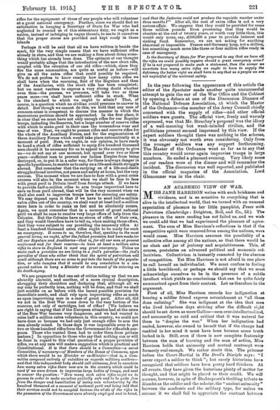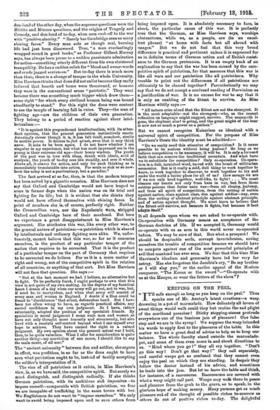AN ACADEMIC VIEW OF WAIL
MISS JANE HARRISON writes with such briskness and vividness, and is so sensitive to everything that is alive in the intellectual world, that we turned with an unusual expectation of pleasure to her little pamphlet, Peace wills Patriotism (Cambridge Deighton, Bell, and Co., 24.). The pleasure in the mere reading has not failed us, and we wish we could add that we had experienced the pleasure of agree- ment. The sum of Mies Harrison's reflections is that if the competitive spirit were removed from among the nations, wars would cease. Miss Harrison assumes the possibility of a collective ethos among all the nations, so that there would be no clash and jar of jealousy and acquisitiveness. This, of course, postulates an advanced political and economio col- lectivism. Collectivism is instantly connoted by the absence of competition. Yet Miss Harrison is not afraid in one place to call herself an individualist. We must confess to feeling a little bewildered; or perhaps we should say that wo must, acknowledge ourselves to be in the presence of a subtle intellect which yields no conclusions that can be quite fairly summarized apart from their context, Let us therefore to the argument.
First of all, Miss Harrison records her indignation at hearing a soldier friend express astonishment at "all these dons enlisting." She was indignant at the idea that men who lived laborious days striving after the difficult right should be set down as mere Gallios—men over.intellectualized, and necessarily so cold and critical that it was natural for them to "despise the war." When her indignation had cooled, however, she owned to herself that if the charge had rankled in her mind it must have been because some truth lurked in it. Still, even if there is now complete fraternity between the man of learning and the man of action, Miss Harrison holds that animosity and mutual contempt were formerly real enough. We rather doubt this. The prisoner before the Court-Martial in The Devil's Disciple says: "I never expect a soldier to think "; but sorely historians have recognized that soldiers have been pretty bard thinkers. At all events, they have given the historians plenty of matter for thought, and that might be placed to their credit. We will assume, however, in spite of Shakespeare's thrilling tribute to Hamlet se the soldier and the scholar, the " ancient animosity between the academie and the military type, for unless we assume it we shall fail to appreciate the contrast between don-lund of the other day, when the supreme questions were the Hittite and Minoan questions, and the origins of Tragedy and Comedy, and don-land of to-day, when men rash off to the war with " positive alacrity." " Rarely has Cambridge seen so many shining faces." Every man acts as though real, burning life had just been discovered. True, "a man everlastingly wrapped round in good books," as Professor Gilbert Murray says, has always been prone to a sudden passionate admiration for aotion--something utterly different from his own cloistered tranquillity. He has a sudden relish for" blood and swear-words and crude jagged sentences." But to-day there is much more than that; there is a change of temper in the whole University. Mica Harrison thinks that dons did not enlist became they really believed that hearth and home were threatened, or because they were in the conventional sense "patriotic." They went because there was something much bigger which drew them— some right " for which every civilized human being was bound steadfastly to stand." For this right the done were content to see the temple of learning fall in ruins. They—the man of fighting age—are the children of their own generation. They belong to a period of reaction against sheer intel- lectualism :— " It is against this preponderant intellectualism, with its atten- dant egotism, that the present generation instinctively reacts. Amazingly clever though it is, it has felt itself, somehow, sterile in motive power. It desires to/eel afruh, even that it may think anew. It asks to be born again. I do not know whether I am singular in my experience, but what has most impressed me in the young is their extreme old age—their hoary wisdom. The youth of the past was in love with ideas!, drunk with ideals, avid of analysis; the youth of today seas life steadily, and sees it whole. Above all, it craves for action, and only for such thinking as is immediately translatable into action. For souls so sick or so new- born the army is not a penitentiary, but a paradise."
The fact arrived at so far, then, is that the modern temper has been suited by a gigantic occasion. Miss Harrison does not say that Oxford and Cambridge would not have leaped to arms in former days when the nation was on its trial and fighting for its life; but it is evident that she thinks they would not have offered themselves with shining faces. In point of numbers she is, of course, perfectly right. Neither the Cromwellian ware, nor the Napoleonio wars, stripped Oxford and Cambridge bare of their manhood. But here we experience a great disappointment in Miss Harrison'. argument. She attributes this war, like every other war, to the general nature of patriotism—a patriotism which is shared by intellectuals and 'ordinary fighting men alike. We, unfor- tunately, cannot believe that this war, so far as it concerns ourselves, is the product of any particular temper of the nation that requires to be corrected. That it is the product of a particular temper on the part of Germany that requires to be corrected we do believe, For us it is a mere matter of right and wrong, not of the competitive spirit in the relation of all countries, or anything of that sort. But Miss Harrison will not face that question. She says:- " But at the last moment we had, I believe, no alternative but to fight. To be perfectly frank, I ought perhaps to own that this view is not quite of my own making. In the depths of my fanatical heart I dream of a day when our army will go out, not to war, but, if need be, to martyrdom, and when that army will consist of every man and woman in England. I doubt if a Hun could be found to • durelhanon • that silent, defenceless band. But I have been too often wrong to have, as regards practical affairs, any rooted confidence in my own judgment. So I have, rather reluctantly, adopted the position of my specialist friends. By specialists in moral judgment I mean such men and women as have not only thought more honestly and strenuously, but also lived with a resolute self-control beyond what I can myself ever hope to achieve. They have earned the right to a valued judgment. My own opinion about the present actual war I hold, then, to be quite valueless. What I offer for consideration is quite another thing—my conviction of one cause, I should like to say the main cause, of all war."
The "ancient animeeity " between don and soldier, she argues in effect, was profitless, in so far as the dons ought to have seen what patriotism ought to be, instead of tacitly accepting the soldier's interpretation of it.
The vice of all patriotism as it exists, in Miss Harrieon's view, is, as we have said, the competitive spirit. But surely we must distinguish, and distinguish radically. If she thinks German patriotism, with its ambitions sieh imponiren —to impose oneself—comparable with British patriotism, we fear we are incapable of trafficking in the same terms with her. We Englishmen do not want to "impose ourselves." We only want to avoid being imposed upon and to Rave others from being imposed upon. It is absolutely necessary to face, in short, the particular cause of this war. It is perfectly true that the German, as Mies Harrison says, worships abstractions, while we, as a people, are (in an excel- lent phrase) "at home with facts but all abroad with images." But we do not feel that this very broad difference is practical and pertinent unless it is expressed for us in definite terms of German action and of British resist- ance to the German pretension. It is an empty husk of an explanation to say that the war has been caused by the com- petitive spirit of patriotism, for that assumes that this war is like all wars and our patriotism like all patriotiams. Why trouble to point out tho differences if all patriotisms are ultimately to be classed together? Parenthetically we may say that we do not accept a confused reading of Darwinism as a justification of war. It is no excuse for war to say that it is only an enabling of the fittest to survive. As Miss Harrison wittily says "All nature cries aloud that the fittest are not the strongest. It is the most adaptable—not the strongest—who, as the merest reflection on language might suggest, survive. The mammoth is gone, tho elephant alas! is going, and the great might of the bear is now not so much a power as a pathos."
But we cannot recognize Kaiserism as identical with a universal spirit of competition. For the purpose of Miss Harrison's thesis the identity must be admitted:—
" Do we really need this stimulus of competition P Is it never possible to be zealot's without being jealousy So long as we believe competition to be necessary, it will be. It is only a forward faith that can remove the traditional mountain. And what have we to substitute for competition ? Only co-operation. Co-epees- tion is a dull, tarnished word, tarred with the brush of utilitarian economics. But is it really a cold, dull thing to work together to know, to work together to discover, to work together to try and make the world a better place for all of us P low savage we are if we MU only herd together, wolf-like, to fight! . . We must eleanae our hearts not only from hate in war, but from those subtler poisons that fester unto war—from all rivalry, jealousy, and from all spirit of competition, from the setting of nation against nation, class against clam, don against soldier—nay, even from the setting of abstract principle against abstract principle, and of action against thought. We most learn to believe that the fittest will survive, not because it fights, but because it best adapts itself."
It all depends upon whom we are asked to co-operate with. Co-operation with Germany means an acceptance of the German doctrine of life. If we accepted it, Germany would co-operate with us as men in this world never co-operated before. We may be sure of that. But what a prospect ! We should be despicable serfs, corrupt invertebrates, saving ourselves the trouble of competition because we should have to compete against one of the most powerful principles of evil that mankind has ever seen. We fear that this time Miss Harrison's idealism and generosity have led her very far astray. Has she forgotten the Jacobin's cry. "Be my brother or I will slay you," or the earlier appeal of the Moslem conqueror, "The Koran or the sword "—" 0o-operate with us at the Mosque, or wear the fetters of the slave"?







































 Previous page
Previous page